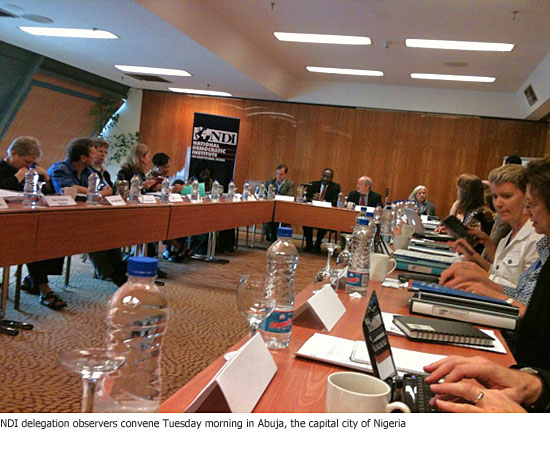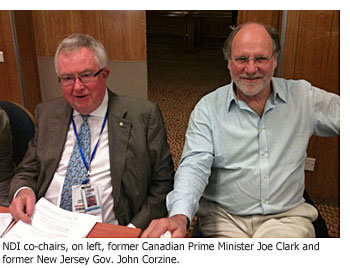What’s at stake
April 5, 2011
 My first day in Nigeria as part of the NDI election observer team has consisted of intensive briefings—eight of them—on the upcoming presidential contest. We’ve heard from non-partisan citizen election monitoring groups, local civil organizations, journalists, government security personnel and others.
My first day in Nigeria as part of the NDI election observer team has consisted of intensive briefings—eight of them—on the upcoming presidential contest. We’ve heard from non-partisan citizen election monitoring groups, local civil organizations, journalists, government security personnel and others.
Our delegation is an impressive group. It is led by former Canadian Prime Minister Joe Clark, former New Jersey Governor John Corzine and former President of Niger Mahamane Ousmane, among others. There are several delegates from Europe and Australia. And there are a number from the African continent itself—from Ghana, Cameroon, South Africa, Kenya and Benin.
The delegation also has a contingent of observers from emerging democratic nations, including the vice chair of a political party in Egypt. During the uprising, he spent 18 days in Cairo’s Tahrir Square. He’s in Nigeria not only to monitor the election, but to look for lessons he can apply to the first potentially free elections in Egyptian history.
Although the Middle East and North Africa have gotten virtually all the headlines in recent weeks, the stakes in West Africa are high, as well. In Cote d’Ivoire (Ivory Coast), for example, the duly defeated incumbent president has refused to leave office, resulting in massive violence and nearly 1,000 deaths in recent days.
Still, the elephant in the electoral room is Nigeria.
 At 165 million people, Nigeria is the most populous country in Africa and it has had a checkered political history since gaining independence from Great Britain more than half a century ago. Almost three decades of military rule came to an end in 1999, when Nigeria undertook the first of several attempts to democratically elect its leaders.
At 165 million people, Nigeria is the most populous country in Africa and it has had a checkered political history since gaining independence from Great Britain more than half a century ago. Almost three decades of military rule came to an end in 1999, when Nigeria undertook the first of several attempts to democratically elect its leaders.
That first election was not a confidence builder, and those that followed, in 2003 and 2007, had increasingly more problems. Indeed, NDI concluded that the 2007 election did not reflect the will of the Nigerian people. So, as one of our briefers told us, “We need to get this election right.”
There’s a herculean effort underway to make that happen. And there’s a lot riding on it not only for Nigeria but also for its West African neighbors and beyond. That’s why it’s being closely watched across the African continent.
Already, however, problems have arisen.
To start, election laws were passed so late by the national legislature that many people closely involved in the process have been unable to get a current copy of them. Then, ballots and other election materials were not delivered to polling places on time for the assembly elections, forcing officials to delay them a week. As a result, the presidential election, scheduled for next Saturday, will not be held until April 16.
Then there are the practical issues, such as the nation’s waning infrastructure. One of our briefers explained that some polling places are outdoors—“under a tree”—and when it gets dark, there’s no way to illuminate the polling site because there’s no electricity. The inferior roads, meanwhile, make it difficult to move election equipment and materials to their destination. Information technology and access to the Internet are not as universal as back home. In short, this is a challenging place to run a smooth and transparent election for upwards of 75 million voters.
Yet the will of the Nigerian people to pull this off is palpable. There will be upwards of 40,000 Nigerian observers watching the 120,000 polling locations on election day.
One of the most sophisticated efforts to avoid the failures of the past comes from an organization called “Project 2011 Swift Count.” To guard against vote tallies changing between polling places and regional tabulation centers (a problem in the past), “Swift Count” will monitor
counts at their origins and shine a light on any efforts to “modify” them along the way.
For information on what these civil organizations are doing in this election, go to their website at Nigeriawatch2011.org.
What’s so moving and inspiring about all this is the awesome courage and commitment that these practical idealists possess. It even made me forget that my suitcase didn’t arrive here in Abuja.
We take our democracy so much for granted that we often forget how special and fragile this form of government can be. As Americans, we benefit from the spread of democracy around the world. But the principal beneficiaries are the emerging democracies themselves.
Photos by Zev Yaroslavsky
Posted 4/5/11












 405 bridge work causes a stink
405 bridge work causes a stink





